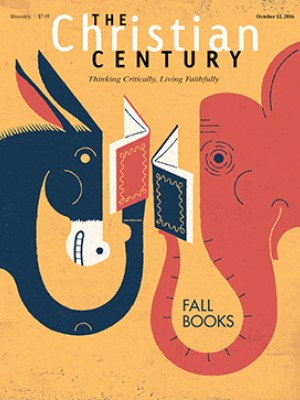When the police come asking about your mentor's past

I was 18, grieving at the loss of my mother and confused about the immediate future, when I met a remarkable man. He was fascinating, challenging, charismatic, thrilling, and intriguing. Around him was a community of young men and women. I was captured by his directness.
He said, “In a way it’s good your mother has died now. You’ve grown out of the shadow of a parent, but you haven’t yet developed a friendship as an adult. That means you’ve only got one grief, not two. It’s easier.” I’d never met anyone who said things like that with such pastoral wisdom, unsentimentality, confidence in his own judgment, and without fear of giving offense.
Read our latest issue or browse back issues.
I moved into his house where many members of the community lived. Everyone slept on the floor as a practice of humility. We rose to pray at 6 a.m. each day—he rose much earlier.
Again I sought his counsel. My mother’s family history was full of secrets. She’d spent her life in the shadows, not talking about things that spelled danger and risked discrimination. What was I to do with these stories? “They’re yours now,” he said, with the same gentle but unswerving insight. “When she was alive they were hers, but now you do with them as you see fit. Don’t confuse secrecy with guilt. These stories can be a blessing to you even if they felt like a curse to her.”
It was a liberating season—of intensity in community, prayer, relationship, calling, simplicity, and gentleness—of heightened awareness and acute impressions.
A couple of years later the brother of a friend of mine died suddenly and I went back to the man for advice. “I don’t know what to think or feel or do,” I said. “Go and see your friend,” he said. “You’ll be given the words to say.” I felt like Elijah when he was asked what he was doing on Mount Horeb. I left humbler but wiser, deflated but empowered.
A few years later a policeman knocked on my door. This man I’d known so closely and well, who’d been my guardian and my guide, was being prosecuted for an inappropriate relationship with an underage young man. What did I know? What had I seen? Had I been part of a cult? Was I suppressing something to protect him or me?
The media didn’t get too excited. The man was given a noncustodial caution. After all, good people—great people even—can make mistakes, be misinterpreted, be naive, and be used. I talked with my friends from those days. Some muttered darkly that they weren’t surprised. Others, like me, were stupefied.
Twenty years later another policeman came calling. The case was being reopened. Now there were many more accusations; people had surfaced with painful stories, accounts that hinted at a pattern of manipulation, intimidation, and exploitation. I gave a statement. Should I reinterpret that intense and fervid time, I wondered? Had I been spared something? Was this man rotten to the core, or a Jekyll and Hyde character capable of both goodness and corrupt conniving? Was this a case of unresolved sexuality, or a grotesque misuse of power?
The man is currently in prison for a fair stretch of time. It turns out that much of what’s come to light was known 20 years ago, and prominent people who suppressed things have spoken up. Such accounts were once considered unfortunate exceptions. Victims believed that no good would come of seeking redress, and institutions convinced themselves that their reputations had more to gain from evasion than from transparency and repentance. But the public mood has changed: now there’s a full-scale public inquiry into cases of this kind, engaging the agony and fury of victims who were sometimes as antagonized at being denied a hearing years ago as they were by the experiences they originally suffered.
There’s a famous 1895 cartoon of two clergymen sitting at lunch in a London club. The bishop says, “I’m afraid you’ve got a bad egg, Mr. Jones.” The curate responds, “Oh no, my Lord, I assure you that parts of it are excellent!” I still believe that parts of the man I knew so well were excellent. At times he was an extraordinary blessing to me.
That was the prevailing culture when his case was first brought to court—not to let the trouble he’d got mixed up in alloy the good he’d done. But in the last 20 years, people have looked at that cartoon and decided that it’s not about things being a mixture of good and bad. The curate, eager to please, is using a euphemism. The truth is, a bad egg is bad: it’s absurd to say parts of it are good. The mood has changed for very good reasons. In many cases the church’s role in such stories is lamentable.
But often the good and the bad are not easily disentangled. Just as at 18 I was naive to see only unqualified good, today I’m reluctant to cast the man as unambiguously bad. If it were a case of total depravity, it might be easier, but what justice and redemption are dealing with, rather more often, is ambiguity.
A version of this article appears in the October 12 print edition under the title “Partial depravity.”







